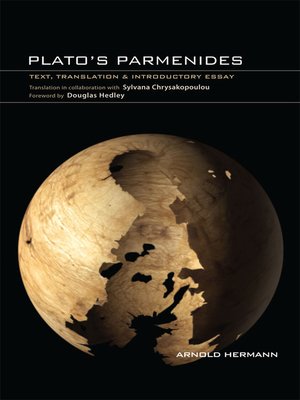
Sign up to save your library
With an OverDrive account, you can save your favorite libraries for at-a-glance information about availability. Find out more about OverDrive accounts.
Find this title in Libby, the library reading app by OverDrive.



Search for a digital library with this title
Title found at these libraries:
| Loading... |
This translation is the result of a collaboration between Arnold Hermann and Sylvana Chrysakopoulou. Heeding the challenge of balancing intelligibility with faithfulness—while maintaining sufficient consistency to allow the discernment of technical terms—great pains have been taken to secure both accuracy and accessibility. In his Foreword, Douglas Hedley gives an insightful account of the way the Parmenides was received by different cultures and philosophical schools throughout the centuries to the present day.
Hermann's Introduction, aimed at first time readers and professional interpreters alike, offers an overview of the most noted philosophical problems addressed in the dialogue, and of its historical background. In view of the fact that certain individual issues have been exhaustively explored by generations of scholars, Hermann chooses to focus also on subjects that have at times been passed over, or trivialized: the debt the dialogue may owe to the works of earlier thinkers, or whether it constitutes a response to certain critics of the Theory of Forms; as for the Theory itself, whether it is bolstered or superseded by the dialogue's conclusions, or whether there is such a thing as a "simple," unparticipated Form, and if there is, why it cannot be the subject of an account; also, the issue of the "interweaving of Forms," (the Sophist) is discussed, in light of its possible relevance to the Second Part of the Parmenides. Finally, Hermann provides an overview with a listing and summaries of the individual conclusions to each of the eight central arguments of the dialgoue's Second Part (plus Coda).






